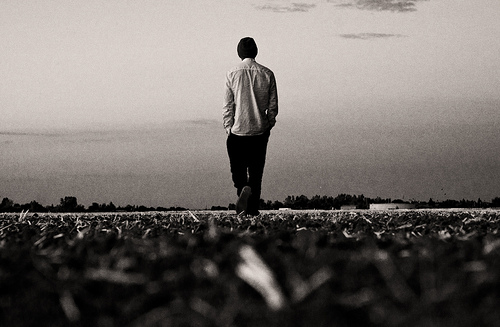*Disclaimer: Elephant Journal articles represent the personal opinion, view or experience of the authors, and can not reflect Elephant Journal as a whole. Disagree with an Op-Ed or opinion? We’re happy to share your experience here.
This Father’s Day, I won’t be sending my biological father a card.
There will be no new neckties, no BBQ, no homemade cake or pictures of the two of us smiling and laughing over an inside joke.
I haven’t spoken to him in over 20 years.
Sure, I’ve seen him a couple times at family functions like weddings and birthdays but we don’t interact. If I enter a room, he’ll usually leave it. That’s the extent of our relationship and I am truly okay with it.
I don’t want anything from my father. He has already given me enough. I’m here. I’m alive and I’m doing great.
That gift is plenty.
Still, people ask me all the time how I managed to overcome my anger at my father. They want to know how I can forgive a man who abandoned his 11-year-old daughter, and did so heartlessly and cruelly. My father’s behavior was shocking. Looking back, I still have a hard time understanding how he did it and with such spite and anger directed at an innocent, confused child.
Now that I’ve grown up and had my own daughter, I still can’t imagine ever hating her so much that I would ever want her completely out of my life. That’s unfathomable to me.
Forgiving my father took decades and it wasn’t an easy thing to do, though it was necessary and essential for me to move forward and to evolve into a wiser, more compassionate and more spiritual person.
Forgiveness is a journey, and often a complicated, painful, difficult process.
Letting go is hard, especially when it involves a parent because often, we tend to idealize what the parent/child relationship ought to be and we long for the images of perfect families we see in the media, believing that is possible for us.
I had to accept that my father would never be the “dear old Dad” type for me. I had to mourn that loss, which really was never the loss of my actual father, but rather the loss of the fantasy of a father I had created who did not and would not exist for me. I think they call this step “facing the facts.”
When I finally accepted that my father could never live up to the standard I had created in my head of the loving, laughing, supportive, present dad I wanted, I could see him for who he was, which was, admittedly, disappointing and extremely limited.
When we take a step back, release our expectations for relationships and see people as they are instead of how we want them to be, we can come to a better understanding of their true nature and begin to empathize.
Through empathy, we may heal.
I was 11-years-old when I sat in a courtroom and listened to my father tell a judge that if I chose to go live with my mother instead of with him that he was through with me for good.
He wanted no visitation, no holidays, no phone calls, nothing.
In fact, he would totally relinquish all parental rights. My father couldn’t empathize with a little girl who wanted and needed her mom and he saw my wanting to live with her instead of him as the ultimate betrayal. His behavior was childish and selfish, vindictive and totally lacking in compassion.
But just because he behaved that way, didn’t mean I had to as well. I hated those qualities in my father, so I certainly didn’t want to breed his same level of spite and contempt in myself.
Putting myself in my father’s position was the most difficult part of the forgiveness process because his reaction was so horrible and so foreign, but I tried to see him as a hurt, angry young man who had not learned how to manage and deal with his emotions.
He was and still is a person who hides his pain and insecurity behind a façade of stubbornness, tyranny and self-righteous indignation. If I chose to see his abusive actions as symptoms of great internal suffering, I could feel sorry for him instead of resenting him. Only a lost and pitiful soul could harm a child.
In order to have hurt me, he must have been deeply wounded himself. I couldn’t hate a wounded man. I could only feel compassion and sadness for whatever had happened to him that prevented him from being a truer expression of the loving father I needed.
Practicing forgiveness often involves a radical shift in perspective from victim to student.
For a long time, in my pain, I focused on all the terrible things my father had done to me. When I began to feel some compassion for his pain instead of wallowing too much in my own, I was able to see the positive that had come from my experiences.
I asked myself this:
“What lessons did I learn from my father’s abandonment?”
Instead of feeling robbed and looking only at what was missing from my life because of my father’s actions, I chose to finally see how my father had actually given me some tremendous gifts.
The pain he caused me as a child made me into a more thoughtful, considerate adult. By showing me the damage a parent could do, he made me a better and more mindful mother. Through suffering, I believe I became an empathetic and compassionate writer and I believe that my life’s mission is to help others through their pain and to bring hope through my words. If my father had never mistreated me, I may not have had the foundation necessary to do this work.
But my father gave me an even greater gift—five greater gifts to be exact.
My father gave me siblings: three sisters and two brothers.
Besides my daughter and my husband, these siblings are the best thing that has ever happened to me.
You see, after I went to live with my mother, my father and stepmother moved away and went on to have five more children and though we didn’t grow up together or even know one another, we have connected as adults. I’m older than they are, but now that we are all adults for the most part, the age differences aren’t really a big deal.
Two of my sisters have children so my daughter has real cousins! And the thing is, my siblings grew up with my father too. They know how stubborn and difficult and emotionally unavailable he is. They understand.
My evolving relationships with my siblings aren’t based on a shared hurt though. We are getting to know one another and we don’t spend too much time worrying about our father’s issues. In the past couple years that I’ve gotten to know my brothers and sisters, I’ve been amazed at how interesting, funny, creative, quirky and well, fun they all are.It’s amazing how much we have in common even though we weren’t raised together. We talk on the phone, email, share photos on Facebook and plan hilarious summer reunions and we are creating the memories together that we didn’t get to have as kids. It has been amazing. Sometimes I feel so lucky that I can’t even believe something this great is happening to me.
My father removed himself from my life, but he gave me five more beautiful souls to welcome and to embrace. For that alone, I love this man.
Loving and forgiving my father in spite of everything doesn’t mean that I care to seek out a relationship with him. I’ve learned to set boundaries and forgiveness for me involves distance.
I don’t need my father in my life.
I still believe that he has a lot to work through and that allowing him back in would be opening a long closed door to his toxic behavior. Besides that, he and I share vastly different values and worldviews and I simply cannot support some of his antiquated, evangelical beliefs. I respect his choices, but I don’t want to be around that kind of energy.
This Sunday on Father’s Day, I won’t be sad because I don’t have the relationship with my father that I once wished for. So many of us have absent or less than ideal dads in and out of our lives and Father’s Day can be difficult for people who are still doing the hard work of healing.
We must let go of old expectations, see our fathers for who they really are even when that isn’t so pleasant, empathize with their wounds and change our perspectives so that we can see the gifts our fathers gave us instead of how we have been hurt.
Love elephant and want to go steady?
Sign up for our (curated) daily and weekly newsletters!
Editor: Renée Picard
Photo: Flickr











Read 7 comments and reply